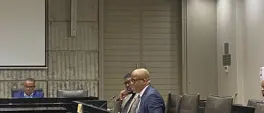Ramaphosa: US tariffs highlight urgent need to adapt to 'turbulent headwinds in international trade'
Babalo Ndenze
4 August 2025 | 8:24President Cyril Ramaphosa said that the United States (US) government’s new tariffs would have a 'considerable impact' on local industries that rely heavily on exports to that country.

President Cyril Ramaphosa presided over the swearing-in ceremony of Minister Firoz Cachalia at the Union Buildings in Pretoria on 1 August 2025. Picture: @PresidencyZA/X
CAPE TOWN - President Cyril Ramaphosa said that the United States (US) government’s new tariffs would have a "considerable impact" on local industries that rely heavily on exports to that country.
He said the 30% tariffs imposed on imports into the US would also impact the workers of South African exporters, as well as on the country’s fiscus.
Ramaphosa issued the warning in his latest newsletter, which focused on the US trade tariffs, which come into effect on Thursday.
The president said that the decision by the US to impose a 30% tariff on South African imports highlighted the urgency for the need to adapt to what he called "turbulent headwinds in international trade".
Ramaphosa said that domestic sectors such as agriculture, automotive and textiles had historically benefited from duty-free access to the US market under the African Growth and Opportunity Act (AGOA).
But the incoming tariff regime could potentially reverse the positive gains made under AGOA.
Arguing South Africa's case, Ramaphosa added that South African imports "ultimately benefit US consumers in terms of both choice and cost".
Ramaphosa said that an example of this was how citrus production was "counter-seasonal" and did not pose a threat to US production.
He said that South Africa was also the biggest investor from the African continent into the US, with 22 South African companies investing in a number of sectors including, mining and pharmaceuticals.
Ramaphosa said the country had been engaging the US to enhance "mutually beneficial trade and investment relations" and all channels of communication remained open to engage.
Get the whole picture 💡
Take a look at the topic timeline for all related articles.
Trending News
More in Politics

4 February 2026 11:10
Road Accident Fund technically bankrupt": Department of Transport warns of major fiscal risk

4 February 2026 04:17
Steenhuisen expected to make announcement likely to impact his political career

3 February 2026 14:43
No easy fix: Road Accident Fund pleads with Parliament over broken funding model












